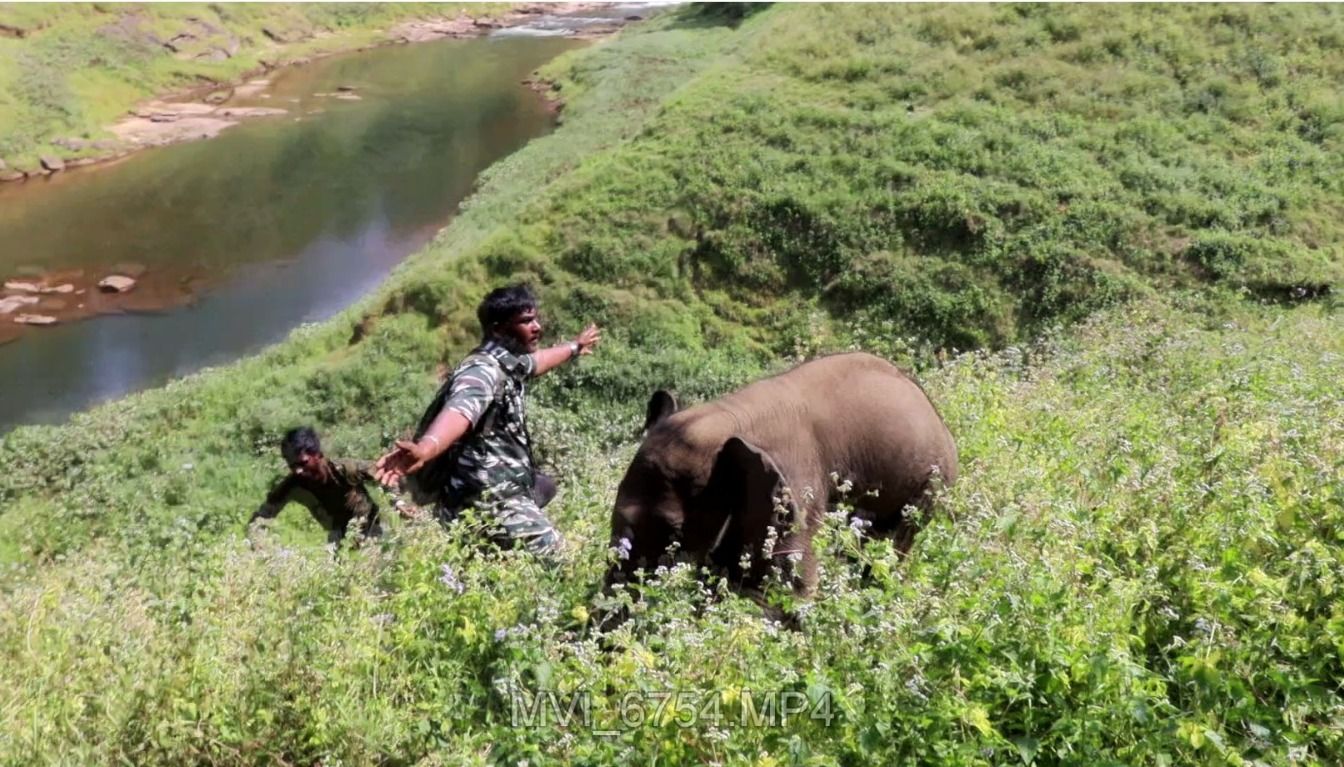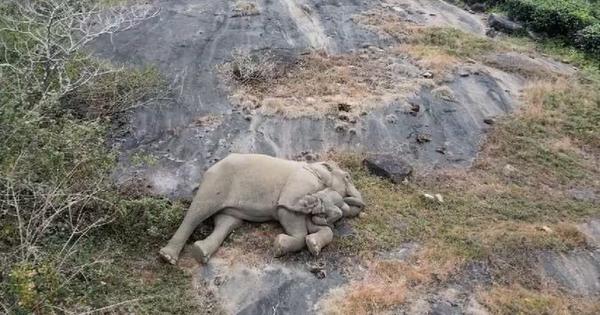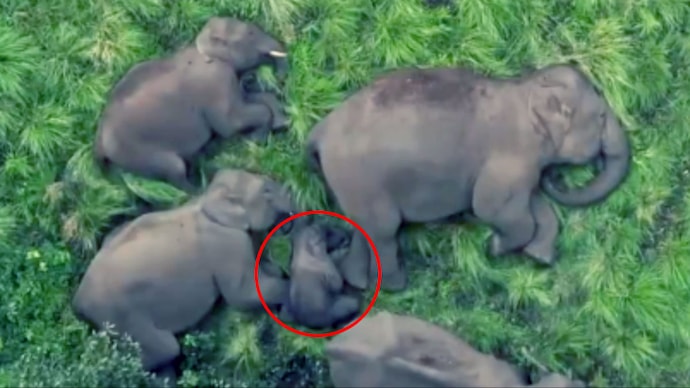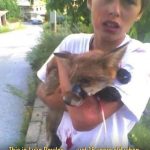“The Long Road Home: An Elephant Calf’s Journey Back to Love”

“The Long Road Home: An Elephant Calf’s Journey Back to Love”
Lost, but never forgotten. 🐘💚
In the sprawling emerald wilderness of Tamil Nadu, where mist drapes the mountains like a silken veil and rivers cut their way through ancient forests, life moves to the rhythm of nature’s heartbeat. Here, the cries of langurs echo across the valleys, the vibrant feathers of hornbills flash in the sunlight, and deep within the forest, a family of elephants roams—majestic, bonded, and timeless.
It was in this sanctuary of life that tragedy struck.
The Separation
The herd had been moving together since dawn, treading a familiar path to a watering hole. The matriarch, wise with decades of memory, led the way, while calves played under the watchful gaze of their mothers. Among them was a five-month-old calf, still learning to use his tiny trunk with grace, often stumbling on uneven ground but always under the comforting shadow of his mother.
But the forest can be unpredictable. The summer had been harsher than usual, and water sources were dwindling. Human settlements had pushed deeper into elephant territory, and with them came dangers—fencing, machinery, and noise that confused and frightened the animals. Somewhere between the rustle of palm leaves and the thundering of distant trucks, chaos erupted.
A sudden loud noise startled the herd. In the confusion, the calf was swept in the opposite direction, his small legs unable to keep pace with the stampede of larger bodies. One moment he was brushing against his mother’s side, the next he was alone—his family’s scent fading with each passing second.
The jungle, once a playground, became an endless maze.
The First Night Alone
As dusk fell, the forest changed. The warm gold of sunlight turned into shadows, and every rustle in the undergrowth sent the calf’s heart racing. He called out—a high-pitched trumpet—but only silence answered.
Night in the Tamil Nadu forest is a symphony of sounds: the distant roar of a leopard, the chirp of crickets, the low growl of wild boars. But to the lost calf, every sound was a threat.
He huddled under a fig tree, trembling, his ears twitching at every movement. The soft earth beneath him still carried the fading scent of his herd, but it was too faint to follow. Hunger gnawed at him, but fear kept him rooted in place.
Somewhere far away, his mother searched, her powerful calls traveling miles. But the dense terrain and the confusion of scents kept them apart.
The Discovery
It was on the second day that forest rangers spotted the calf. They had been patrolling after reports of an elephant herd seen near a village, concerned about potential conflict with humans.
Through the thick foliage, they saw him—a tiny figure for an elephant, his skin dusty and his eyes wide with fear. His ribs were visible beneath his wrinkled hide, his steps unsteady. He didn’t charge or trumpet; he just stood there, frozen, watching them.
The rangers knew that approaching him recklessly could be dangerous. Though he was small, his instinct for survival could make him panic and flee deeper into the forest, making rescue harder. They kept their distance, observing.
The team leader, Arjun, a man who had spent 20 years protecting Tamil Nadu’s wildlife, whispered, “If we don’t act now, he won’t survive another night.”
The Plan
Rescuing a wild elephant calf is no simple task. The rangers needed to balance urgency with caution, ensuring the calf was not further traumatized.
They decided to mask their human scent by covering themselves in wet mud and leaves, blending in with the forest. The scent-masking was crucial—it would keep the calf from associating them with danger and, later, would help in reuniting him with the herd without alarming the mother.
They approached slowly, speaking in low tones, avoiding direct eye contact to keep him calm. A soft call, mimicking the rumble of elephants, was made to reassure him.
At first, the calf backed away, his ears flaring and trunk lifted in uncertainty. But exhaustion and thirst overcame his fear. When one ranger gently set down a bucket of water a few meters away, he hesitated, then stepped forward, drinking greedily.
That was the moment they knew they had gained his trust.
The Journey Back
The next step was tracking the herd. It wasn’t easy. Elephants can cover vast distances in a short time, and the forest terrain made following their trail challenging. But the rangers were experts—they read the broken branches, fresh dung, and footprints pressed into the damp earth like an open book.
For two days, they carried the calf along the herd’s path, stopping often to let him rest and feed. He was surprisingly cooperative, as if some instinct told him they were leading him home.
On the third day, they caught the faint sound of low rumbles in the distance—elephant communication. The calf’s ears perked, his steps quickening. He raised his trunk and trumpeted, the sound raw but filled with urgency.
The rangers froze. If the herd was nearby, this was the most critical moment. A mother elephant, believing her calf was in danger, could charge with deadly force.
The Reunion
They decided to wait, allowing the mother to come to them. Slowly, through the trees, a massive shape emerged—the matriarch, flanked by other females. Their eyes locked on the calf, and a deep, resonant rumble filled the air.
The calf broke into a clumsy run, calling out in high, frantic trumpets. His mother answered, her pace quickening until they collided in a tender, almost human embrace—her trunk curling protectively around his small body.
The other elephants formed a circle around them, their low rumbles vibrating through the ground. It was a moment of pure, wordless joy—a reunion written not in human language but in the eternal bond of family.
The Morning After
The rangers kept their distance, watching as the herd settled for the night. The calf remained pressed against his mother’s side, occasionally reaching up to touch her with his trunk, as if to reassure himself she was real.
At dawn, the forest was quiet except for the soft breathing of the sleeping elephants. Mother and calf lay side by side, the morning light turning their skin to gold.
For the rangers, it was the perfect ending to days of tireless effort. They didn’t need thanks—the sight of that sleeping calf, safe and loved, was more than enough.
Why It Matters
Stories like this are more than heartwarming—they are a reminder of the fragile balance between humans and wildlife. Every year, elephant calves are lost due to habitat loss, human-wildlife conflict, and natural accidents. Without intervention, many do not survive.
The rescue in Tamil Nadu was a success because of the rangers’ skill, patience, and deep respect for the animals they protect. But it also speaks to something universal: that love, whether human or animal, will cross any distance, face any danger, and overcome any obstacle to find its way back.
An Unbreakable Bond
Elephants are among the most emotionally intelligent creatures on Earth. They mourn their dead, comfort their young, and maintain lifelong relationships. The reunion between this calf and his mother wasn’t just instinct—it was love, as real and powerful as any human connection.
That morning, as the herd moved deeper into the forest, the calf trotted confidently at his mother’s side. The rangers watched until they disappeared into the trees, their footsteps muffled by leaves.
The forest returned to its rhythm, but for those who witnessed it, the memory of that reunion will never fade.
Because no distance is too far for family to find its way back.











